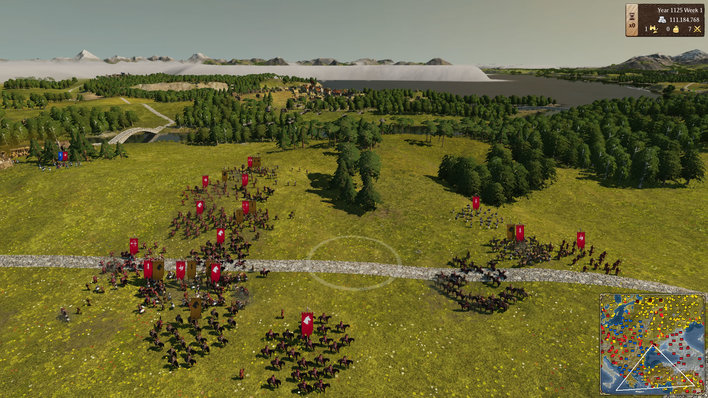While they were once ten a penny on PC, strategy games have always been something of a rarity on consoles. Even more so city building, world conquering, Civilisation style, empire founding strategy games like Grand Ages: Medieval - but that's something publishers Kalypso are keen to put right. Having previously bought the always entertaining Tropico games to consoles - games which are probably best described as "Sim City set in a banana republic, to the tune of Nandos" - adding some much needed variety to the console line-up, the publisher has currently got studio Gaming Minds hard at work on bringing their latest strategy outing to consoles, too - or at least, to the PS4.
Grand Ages: Medieval is a game that look set to be less city builder, and more empire builder, as you set out to found a city from scratch in the year 1050, and grow it from a small collection of a few stick huts and some heavily bearded men, to a bustling metropolis. Play your cards right, and not only will you be able to grow you city, but you'll be able to build even more towns, hamlets and villages, eventually growing it into a glorious empire, as the game's creative director, Daniel Dumont, explained to us at the recent gamescom show:
"Grand Ages Medieval is a mixture of a global strategy game, and an economy game. In a global strategy game, you start with a single town, and you want to become the greatest nation in Europe. To do this, you have to expand, explore and found new towns - but unfortunately, you'll soon come into contact with your opponents, who have the same goal, and you'll need to deal with them with diplomacy, or [maybe] even war. On the economy side, you have to connect your towns with streets, so you can build trade routes. Each town can only produce certain goods, so you'll need to trade to keep your empire growing."

Places you have yet to explore are shrouded in the "Fog of war"
When you first begin in Grand Ages Medieval, you'll have but one small shanty town to play with, although you can choose where you want to build it. The game uses a (fairly) accurate map of Europe as its setting, including little old Britannia off to the side, in a playing field that stretches some twenty million kilometres. In a really nice touch, when you place your town, the game will automatically name it after the nearest city to that point in real life. "The game will always look for a historical town at this position, so if you create a town near London, it'll automatically be named London" - although you do still have the option to name it yourself, much to the chagrin of the future residents of "Bum Town". Where you choose to start your empire is of utmost importance, too, as it determines the goods that city will be able to produce. With 20 different types of goods on offer, and each town only able to produce a maximum of five, you'll need to choose your town's position wisely. Plonk it by a river, and you'll be able to produce fish - stick it in the middle of a forest, and you'll have plenty of logs to go around, and you'll need to trade with those around you to make sure you have all you need.
Your next step is to explore the area around you by sending out a scout. With any luck, before too long you'll happen across another village, and can pester to open a trade route. Diplomacy plays a big part in Grand Ages: Medieval, and as always, the key to a town's heart is through their pocket. By showering them with gifts, you can win yourself favour, which in turn allows you to open a trade route. From the second the other town agrees, you'll be able to trade - but if you find the deal's really paying off for you, you can cement the relationship by building a road (snigger), letting your traders get there a lot faster.
While there's no sign of any Medieval Sim City style shenanigans - you won't have to manage traffic through your village, or build houses in the right places, for example - you can choose which buildings you want each town to have. As in real life, growth is the key in Grand Ages Medieval, and the more your village produces, and the more you trade, the more prosperous your village will become, and the more people you'll attract. The problem is, with great growth comes great responsibility, and before too long, you may well find yourself on the receiving end of some unwanted attention....
Luckily, should this happen, you'll have a few options available. You can always try and barter your way out of a bad situation, feeding the crocodile in the hope it'll eat you last. Or, you can go to war. Like any good strategy game, Grand Ages: Medieval will have battles with thousands of troops on screen, all spilling blood for king and country (or, at the very least, Bum Town). If you're a clever leader, at the same time as growing the economic prosperity of your town, you'll need to be securing it defensively, too, by training troops, and building watch towers along the border of your land.

Which is better - white horse, or black horse? There's only one way to find out...
Of course, it's not just the land you'll need to worry about either, as Grand Ages: Medieval lets you take to the sea, too. Whether you're looking to trade with distant lands in a speedier fashion, or defending your empire from seaborne attack, you'll have the option of producing your very own armada of ships to rule the oceans blue - at least, if you've placed your city close enough to the sea. As with everything in Grand Ages Medieval though, having a dock brings with it plenty of advantages - and several big disadvantages - giving you a whole host of other things to think about - and another way to tweak your strategy to suit.
There's one last thing budding kings and queens will have to worry about though, and that's an enemy that's older than time itself - mother nature. Yes, along with marauding hordes from other villages, pillaging pirates and the odd Spanish Armada, you'll also have a range of natural disasters to contend with, depending on where you've built your city, from plagues and storms, to forest fires and even volcanoes (so Bum Town could erupt? Now it's just getting silly). While we can't imagine we'll have to worry about too many volcanoes if we set up home in the UK, those near Vesuvius might want to sleep with one eye open...

Ports let you take your trading global
With so many things to manage, you'd be justified in wondering how well this is going to transfer across to the limited buttons and fiddly analogue sticks of the PS4. Luckily, the developers have been hard at work on streamlining the interface for the console, as Daniel explains: "In fact, I'd say some things are easier on console. For example, choosing buildings or new businesses is streamlined. What [was] trickier is choosing units. You could have hundreds of units, so we have some functions on the PS4 to make things easier, like a radial menu that lets you select all the troops within 4-500km. We have the same on PC too, so you can play the PC version with a gamepad."
While it can all sound very intimidating, newcomers to strategy games needn't worry, as the game will come with three modes - a free form skirmish mode, a multiplayer mode, and a story mode, with the latter acting as a gentle introduction to the game's principles, set in the land of Constantinople. Designed to help new players find their footing at the same time as having fun, the campaign promises a great way for novices to get started - and it's where we'll be heading when we first get to go hands-on too.
Due for release at the end of the month, Grand Ages: Medieval will grow the PS4's burgeoning library of city/world building strategy games to just two - its sister game, Tropico, being the only other one available. With plenty of options to think about, and the entirety of Europe to conquer (or at least trade with), perhaps it's fortunate, then, that this one should keep you going for quite a while.












